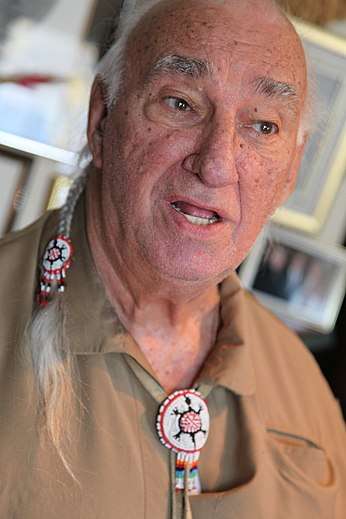Max Gros-Louis
Magella Gros-Louis known as Max Gros-Louis or Oné Onti OC OQ (born August 6, 1931) is a Canadian politician and businessman in Quebec. For many years he was Grand Chief of the Huron-Wendat First Nation. He founded and directed various important organizations, which are dedicated to the culture and rights of the First Nation People in Canada.

Early life
Gros-Louis is the son of Cecile Talbot and Gerard Gros-Louis. He attended school in Loretteville, but left at age 16.[1]
Career
As a young man, Gros-Louis worked as a surveyor and as a travelling salesman. He later opened a small shop "Le Huron" where he sold snowshoes, moccasins and other First Nation crafts and also managed a dance company.[2]
In 1964 he was elected Grand Chief of the Huron-Wendat Nation in Wendake. Between 1965 and 1976 he was successively a founding member, vice president and secretary-treasurer of the Association des Indiens du Québec.[3][4]
In 1983 Gros-Louis represented First nation Quebecers at federal constitutional conferences on aboriginal law. As Chief, he instituted a program to found businesses and create employment in his community.[5] In 1984 he retired from political life, but by 1987 he was back, once more attending constitutional conferences. In 1994 he was re-elected Grand Chief, and remained until 1996.
Gros-Louis was Director and Vice Chief of the Assembly of First Nations for ten years.[6] He was for five years Secretary of the Indian Advisory Council, and he worked as an administrator of the Aboriginal Economic Development Program and a member of the Multiculturalism Council. Gros-Louis has advocated a more individualist approach to economic and social problems than most First Nations leaders.
Max Gros-Louis was once more elected Grand Chief of the Huron-Wendat Nation in 2004, and remained in that position until 2008, when he was defeated by Konrad Sioui.[7]
In 2010 Gros-Louis was involved in a controversy when he accepted a donation for a museum which did not yet exist.[8]
In 2012, a book about the life of Gros-Louis, written by Alain Bouchard, Max Gros-Louis Le corbeau de Wendake, was published.[9] He was awarded as an officer of the National Order of Quebec and in December 2015, he was awarded the Order of Canada with the grade of officer.[10]
Max Gros-Louie has written an autobiography titled First Among the Huron.[11]
Personal
Max Gros-Louis was married to Claire "Tikanakouen" Belair; the couple had five children.
References
- Rencontre. Volume 15-16. Secrétariat des activités gouvernementales en milieu amérindien et inuit. 1993. pp. 172–173.
- Jane Campbell (1 January 2006). The Retrospective Review (1820-1828) and the Revival of Seventeenth Century Poetry. Wilfrid Laurier Univ. Press. pp. 61–. ISBN 978-0-88920-866-7.
- "Un duel entre Sioui et Gros-Louis à Wendake". Le Journal de Québec, Jean-François Racine, 18 September 2016
- Caroline Desbiens (15 May 2013). Power from the North: Territory, Identity, and the Culture of Hydroelectricity in Quebec. UBC Press. pp. 232–. ISBN 978-0-7748-2418-7.
- Canadian Anthropology Society (1992). The Rise of Native Self-Determination and the Crisis of the Canadian Political Regime. Culture. Canadian Anthropology Society. pp. 70–.
- http://edimage.ca/edimage/grandspersonnages/en/carte_m01.html
- "Sioui défait Gros-Louis". Radio Canada, 1 November 2008
- "Max Gros-Louis sème la controverse". Jean-Luc Lavallée, Actualities, Canoe.ca, 16 March 2010
- "À la découverte du vrai Max Gros-Louis". L'Actuel, Isabelle Chabot, 24 September 2012
- "Order of Canada Appointments". The Governor General of Canada His Excellency the Right Honourable David Johnston. Governor General of Canada. Retrieved 31 December 2015.
- "Max Gros-Louis". The Canadian Encyclopedia.